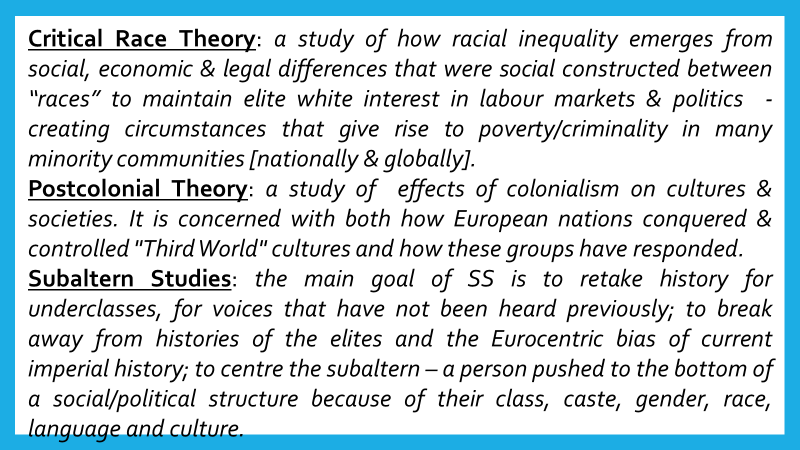Foluke Adebisi (The Law School, University of Bristol)
I was delighted to be able to present different aspects of my research on legal education at the SLSA Conference. My research is pedagogical as well as jurisprudential and examines what happens at the intersection of legal education, race and a history of changing ideas of what it means to be human.
I gave two papers at the SLSA. My first paper was on decolonising the legal curriculum. In UK higher education, discussions of decolonisation revolve around race, gender, class, and examine how these interact with issues of equality, justice, representation, inclusion and diversity. These discussions provide us with an opportunity to reflect on our own academic practices and how all of their aspects came to be. Decolonisation asks for critical inclusion of epistemologies, ways of knowing, lived experiences, texts and scholarly work that have been previously excluded from our disciplines. It asks us to think critically about the relationship between the location and identity of the writer, and the location and identity of their subject (human or otherwise). Decolonisation also asks us to consider the diversity of the student and staff body and how seemingly structured disparities are produced and reproduced within a supposedly randomly collected diverse body.
In thinking about what this means for our academic practices in Law Schools and our understanding of what law is, I find Sara Ahmed’s writings on ‘use’ very instructive. She writes in her blog that ‘use’ can become a subversion of ‘function’. The way a thing is used can subvert its intended function. ‘The more a path is used the more a path is used.’ Law’s uses – historic and contemporary – have often subverted its functions of justice and equality. In my first paper, I consider three theoretical frameworks that highlight the subversive use of law – Critical Race Theory, Postcolonial Theory and Subaltern Studies. Read together, they illustrate how law has been complicit in entrenching race as a global social construct, and in making lawful/normal global inequalities that arise from racialisation. This invites us to view law as an uninterrupted continuum across space and time, to unveil the human consequences of historical control that live on with us.
These theoretical frameworks illustrate how structurally systemic and lawful processes actually enable individual prejudice… not the other way around. The lawful structure makes its outcomes appear to be the natural order of things. Freedom becomes law’s casualty.
I suggest that in our pedagogy, we must address how the law came to be and how much that process of coming-to-be has influenced how law is taught and what law is now. Legal study, as the study of social order, must elucidate how the stratifications in the social are formed and maintained and the impact this has on the implementation of law and making of legislation. Legal pedagogy must expose the nature of law as something more than formal rules. Its content and use are influenced by societal moralities, populist anxieties and the location of national and global power. Therefore, we must question how objective and neutral we can be if we fail to acknowledge voices and experiences that are absent and silenced from our curriculum. This is most important if we believe that law should function as a tool of social change and justice.
Save the mouse!!!
One major suggestion on how to decolonise the curriculum formed the content of my second paper (jointly with Yvette Russell [University of Bristol]), i.e. having a unit on Law and Race.’ Racial disparities abound in our institutions, in our law schools, in our profession and in our discipline. Yet we know that race is socially constructed, without biological meaning. Therefore, it is important that we teach how, ‘law and race shape each other in powerful ways.’ We need to examine how apparently race-neutral laws and policies have racially disparate results in almost every sector of society – education, employment, welfare, housing, criminal justice, etc.
This paper explored how and why Yvette and I developed an optional 3rd year unit – Law and Race. We believe that such a unit is properly situated within the wider context of decolonisation of education and is a powerful tool in decolonising the curriculum. We encourage every Law School to have a similar unit.
Bibliography
Ahmed, Sara. 2017. “Institutional as Usual”. Blog. Feministkilljoys.
Delgado, Richard, and Jean Stefancic. Critical Race Theory: An introduction. NYU Press, 2017.
Gayatri, Chakravorty Spivak, ‘Can the Subaltern Speak?’ in Cary Nelson and Lawrence Grossberg (eds), Marxism and the Interpretation of Culture (Macmillan Education; 1988) 271-313
Grear, Anna, The DNA of our Legal System | Anna Grear | TEDxBonn. https://www.youtube.com/watch?v=U6-byCZR-AY
Said, Edward. “Culture and Imperialism. 1993.” New York: Vintage (1994).
A longer version of this post can be found on Foluke’s blog at: https://folukeafrica.com/decolonization-law-race-the-legal-curriculum-slsa-2018/




Leave A Comment